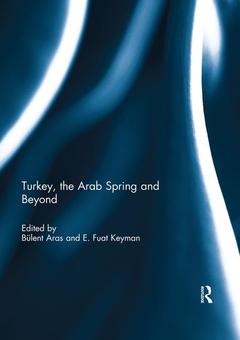Turkey, the Arab Spring and Beyond
Coordonnateurs : Aras Bulent, Keyman Fuat

It has been almost five years now since a new collective consciousness of Arab masses transformed the political landscape of the Middle East and North Africa. In just a short period of time, the people of the Arab world protested against their rulers, putting an end to long-time authoritarian leaders in Tunisia, Egypt, Libya, and Yemen, while bringing others to the eve of collapse. Although the uprisings were initially successful, the people?s strong will to see honour, dignity, rights, and good governance realized within their respective countries was fiercely combated by the ruling strata of these states and their strategies to ensure authoritarian survival.
The changing political landscape and the dynamic processes of the Arab Spring have caught the attention of academics as well. There is a blossoming literature being written on the Arab Spring focusing on social protests, authoritarian resilience and learning, opposition strategies, the rise of non-state actors, state failure, foreign policy, and new the geopolitical landscape. Therefore, with the desire to contribute to this literature, this edited volume aims to address the changing political atmosphere and the challenges of the emerging geopolitical order, particularly focusing on Turkish foreign policy and its response to the Arab Spring. This book was originally published as a special issue of the Journal of Balkan and Near Eastern Studies.
1. Turkey, the Arab Spring and Beyond 2. Mediation as a Foreign Policy Tool in the Arab Spring: Turkey, Qatar and Iran3. Reform and Capacity Building in the Turkish Foreign Ministry: Bridging the Gap between Ideas and Institutions4. Practical Geopolitical Reasoning in the Turkish and Qatari Foreign Policy on the Arab Spring5. The Impact of the Arab Spring on the Gulf Cooperation Council6.Turkey and Iran: The Two Modes of Engagement in the Middle East7. Turkish Foreign Policy towards the Arab Spring: Between Western Orientation and Regional Disorder
Bülent Aras is Professor of International Relations, Sabancı University and a global fellow, Wilson Center. He was the head of the Diplomatic Academy and Center for Strategic Research at Turkey’s Ministry of Foreign Affairs.His recent publications include War in the Gardens of Babylon: Middle East after the Iraqi War (2004), Turkey and the Greater Middle East (2004) and September 11 and World Politics: American Hegemony Reconsidered (2004).
E. Fuat Keyman is Director of Istanbul Policy Center and Professor of International Relations at Sabancı University. Recent publications include Hegemony through Transformations; Democracy, Identity, and Foreign Policy in Turkey (2014), and Symbiotic Antagonism: Competing Nationalisms in Turkey(With Ayşe Kadıoğlu; 2011).
Date de parution : 05-2019
17.4x24.6 cm
Date de parution : 08-2016
17.4x24.6 cm
Thème de Turkey, the Arab Spring and Beyond :
Mots-clés :
Arab Spring; Turkish Foreign Policy; MENA Region; Conflict Resolution and Mediation; Humanitarian Aid; Foreign Policy of Arab Sring; Qatari Foreign Policy; Iran's Foreign Policy; Practical Geopolitical Reasoning; Turkey’s Foreign Ministry; Journal of Balkan and Near Eastern Studies; Turkish Foreign Policymakers; Area Studies; Syrian Opposition; Politics; Vice Versa; International Relations; Foreign Minister; Foreign Policy; Geopolitical Thinking; Arab Spring Protests; post-Arab Spring; Mediation Attempts; GCC State; Turkish Iranian Relations; Arab Spring Countries; Regional Power Rivalries; Military Junta; Relevant Policy Tool; Arab Uprisings; Geopolitical Reasoning; Turkey’s Mediation



